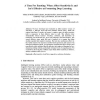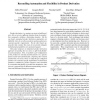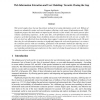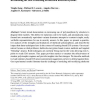971 search results - page 15 / 195 » Automatic prediction of frustration |
ITS
2010
Springer
13 years 9 months ago
2010
Springer
We have developed and evaluated an affect-sensitive version of AutoTutor, a dialogue based ITS that simulates human tutors. While the original AutoTutor is sensitive to learners’...
SPLC
2008
13 years 9 months ago
2008
Product derivation, i.e. reusing core assets to build products, did not receive sufficient attention from the productline community, yielding a frustrating situation. On the one h...
DEBU
2006
13 years 7 months ago
2006
Web search engines have become the primary method of accessing information on the web. Billions of queries are submitted to major web search engines, reflecting a wide range of in...
ISSRE
2010
IEEE
13 years 6 months ago
2010
IEEE
—Large scale systems (LSS) contain multiple subsystems that interact across multiple nodes in sometimes unforeseen and complicated ways. As a result, pinpointing the subsystems t...
ML
2010
ACM
13 years 6 months ago
2010
ACM
Current trends demonstrate an increasing use of polymorphism by attackers to disguise their exploits. The ability for malicious code to be easily, and automatically, transformed in...




